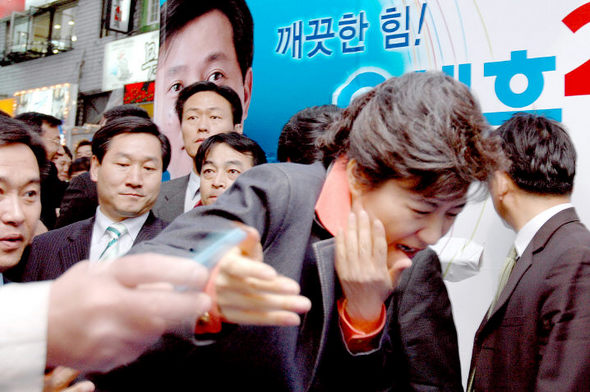 |
|
Park Geun-hye, chairwoman of the main opposition Grand National Party, grimaces after a man slashed her face with a utility knife during an election campaign in Shinchon, western Seoul, on May 20. courtesy of CBS-Nocut News
|
Observers closely watch effects of attack on GNP chairwoman
The assault on Park Geun-hye, chairwoman of the main opposition Grand National Party (GNP), is surrounded by controversy due to the proximity of the incident to local elections, scheduled May 31. With Ms. Park one of leading candidates for president, the attack is expected to have political repercussions. Many political analysts see the incident as a boon for the GNP to further consolidate its support base. They forecast that the assault of Park would lead GNP supporters to feel a sense of urgency, thus increasing the chance for the party to defeat the ruling Uri Party by a larger margin than experts had expected. However, it may be too early to predict to what extent the assault may have on the elections. Considering that before the assault the main opposition Grand National Party was faring well in the campaign, the assualt may have a marginal impact overall. Some observers predict the possible increased support of the GNP following the attack could help replace the role of regionalism, which has traditionally held sway in local elections but has been slipping in influence in recent years. "The GNP commands high approval ratings in the southern city of Daejon. But the approval ratings for Park Seoung-Hyo, a GNP candidate based in that region and running in the [May 31] local election, are not as high [as they have traditionally been]," a candidate spokesman said. "One of the reasons might be that he is not regarded as truly a member of the GNP." The spokeman said that for Mr. Park to win the election, it would be important to link his campaign with the campaign of Ms. Park, in order to portray to voters his proximity to the GNP. Effects on a large scale? Such an assault targeting political figures is nothing new, and has, in some cases, played a major role in changing election outcomes. An example is the shooting injury of Taiwanese President Chen Shui-bian, just prior to the 2004 presidential election. President Chen was reelected amid speculation that the attack could have been self-planned, in order to hike his approval ratings. Many analysts say the assault on Ms. Park will likely strengthen the "bandwagon impact" among voters, who had previously seen her as the election’s underdog, but now will put their votes behind her in greater numbers. If Ms. Park’s party quashes the ruling party in the upcoming elections, the analysts say, it would consolidate Ms. Park's political status and promote the image that she does not yield to anything, even physical attacks on her person. "The incident came at a time when Park faces a critical moment in that she lags behind Seoul Mayor Lee Myung-Bak, another leading presidential candidate in a recent poll, and plans to give up her post as the party's chairwoman [in order to be eligible for the presidency]," a GNP official said.





